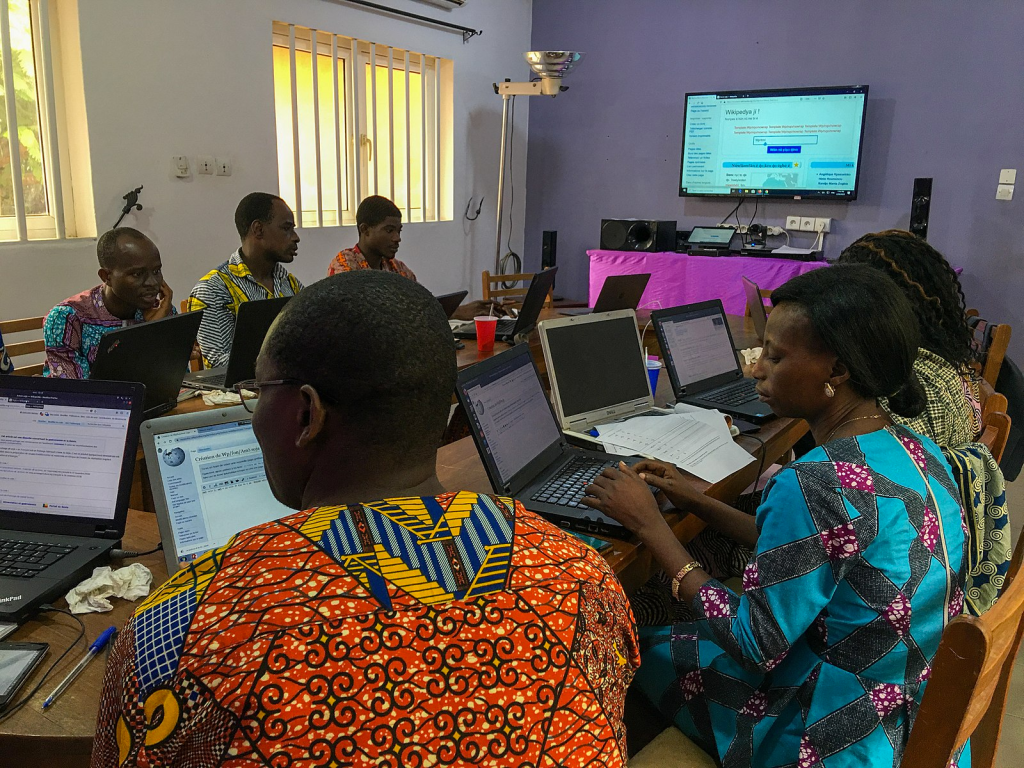Today, Free knowledge can be shared in one more language: Fɔngbè. Fɔngbè, is the mother tongue of millions of people, mostly in Benin and Togo, and millions of others can speak it around the world. It is the most spoken national language in Benin.
After years of working in the Incubator, the Fon Community is happy about this important milestone, making the Fon Wikipedia, the first one of the Benin national language.
It has taken time!
Back in 2018, during the Wikimedia Hackathon in Barcelona, the project started in the incubator with one of the main questions raised at that time: How to write the special characters in Fon alphabet? Quickly, with Amir Aharoni, we managed to implement and deploy a keyboard that ease the work of editing in Fon. By the way, that keyboard became the first in a series of keyboards for languages of Africa, which includes Yoruba, Igbo, Ewe, Dagbani, and others.
Yes, you may be surprised, or … not! But five years may seem too long to create a new language version of Wikipedia. When it started, I was the only contributor, so we needed a community and an active one behind the project. We wanted a sustainable community that could keep the project moving forward over the years.
When I was younger, I fell in love with writing the Fon, and years later, I realized that it is a big privilege as most Fon speakers cannot write it and I guess that is the case for many national languages in Africa. The challenge was then to have volunteers who could write Fon … correctly!
For many years, decision-makers didn’t see the importance of teaching writing Fon in schools in Benin. Instead, they mostly teach literacy in French, and dedicate much less time and attention to our native languages. So many people in Benin can read Fon, but not everyone is able to write it well. Today, this starts changing, Fon classes has started in many public and private schools in Benin and we hope that, in a near future, this gap will be filled.
Then, in 2020, I met Espérance (User:Mespevic), a known Fon teacher in Benin, and we discussed the project. Since then, we have started working together and more Fon teachers have joined the group under Espérance’s leadership. For most of them, it was their first editing experience, and this came with taking the time to train them first. Training on Wikipedia editing rules, adding images to articles, how to use that keyboard, and for some, how to simply use a computer and open a browser. There was a huge digital literacy gap, that was to be filled first. And yes, it takes time to build a strong and active community.
Thank you!
I cannot list the dozen people in the Fon Wikipedia WhatsApp group, but allow me to thank the following users for their contributions to the sum of the knowledge: Fredosbj, Gbehlon, Cenagnon, Gammasko, Alfred, Alote, Fawaz, Adoscam, Medaho and of course a Big thank you to Mespevic for leading the group there.
Here is also the opportunity to thank our partners Wikimedia Bénin user group, WikiFranca, Wikimedia France, Wikimedia Switzerland, AUF Benin, and the Wikimedia Foundation for their support that made it possible for the community to meet regularly and to work on this project in the incubator. Thanks also go to Amir for all the support since day one.
What next?
We have more projects in the backlog. While adding to the sum of all knowledge in the Fon Wikipedia, our group also works to promote the Fon language on the internet and make it accessible to all online. Last week, with the support of Wikitongues, we launched an online Fon typing tool to make it possible for everyone to easily and freely write Fon from their computer on all websites and not just Wikipedia. We hope to request a Fon Wiktionary soon and to develop the first online French-Fon dictionary based on the Wiktionary.
Follow the Fon Wikipedia and the group on social media to know more about what we will be up to.
- Fon Wikipedia on X/Twitter: https://twitter.com/wikipedia_fon
- The Fon Wikimedians communauté on Meta-Wiki: https://meta.wikimedia.org/wiki/Fon_Wikimedians_Community

Can you help us translate this article?
In order for this article to reach as many people as possible we would like your help. Can you translate this article to get the message out?
Start translation
